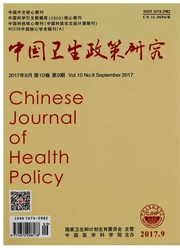

 中文摘要:
中文摘要:
通过系统整理和分析国内外关于公共卫生服务提供的公私合作模式的研究文献,阐述了公私合作模式的内涵、分类和国内外公共卫生服务公私合作的主要方式和实践应用,并阐明了公共卫生服务领域公私合作对减轻政府财政压力、推动卫生体制创新、促进政府职能转换、提高公共卫生服务效率、提高私立卫生机构综合竞争力及贫困人群服务公平性都有积极作用;指出了公私合作过程中存在合作双方缺乏信任、沟通不足、政府管理滞后、职能不强等影响服务效果的问题;建议建立公私部门信息共享机制、设计合理的风险分担机制、改进政府对公私合作的管理手段、强化政府主导作用等措施;启示我国在基本公共卫生服务公私合作供给过程中要强化政府职责、成立第三方组织对公私合作进行协调、沟通、监督和考核以及建立有效的公私合作机制。
 英文摘要:
英文摘要:
By drawing on research literature at home and abroad on the public-private partnerships( PPP) model in the field of public health services,this study discusses PPP in terms of connotation,classification,main cooperative methods and practical application of public health service delivery in different countries. At the same time,it illustrates that PPP in the public health service plays a positive role in relieving the government's financial pressure, promoting the innovation of health system,promoting the transformation of government functions,advancing the efficiency of public health services,raising the comprehensive competitiveness of private health sectors and realizing the health service equity of poor people. This study also aims to identify the problems of a lack of trust,a lack of communication during the public-private cooperation process,and proposes measures including designing a reasonable risksharing mechanism,improving the way government manages PPPs,and making the government's role more central. In China,the government should assume more responsibilities; and third-parties should supervise and coordinate PPP. Third parties should also appraise how effectively PPP are delivering public health services and create effective PPP mechanisms.
 同期刊论文项目
同期刊论文项目
 同项目期刊论文
同项目期刊论文
 期刊信息
期刊信息
